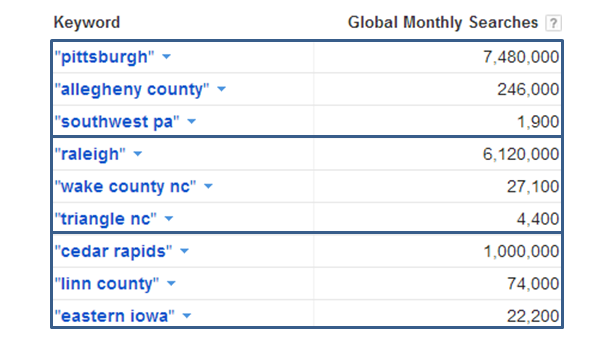Love Thy Neighbor With Local On‑Page Optimization
It’s spring, the season of moving, cleaning and lightening our winter load. Search histories begin to include “donate used school supplies Pittsburgh” and “donate kids shoes Raleigh” and “old computer donation Cedar Rapids.” The searches lead to organizations that specialize in those items and everyone wins.
Or they don’t.
Connections are not always made because many organizations, both nonprofit and for, do not commit to a specific geo. There is a fear of casting a narrow net. If we service the all of Allegheny County or the North Carolina Triangle or Eastern Iowa, shouldn’t the website? For small organizations, the answer is often no.
Should my SEO target a city or broader region?
This article examines some local on-page optimization tips for SMBs and community organizations. Before addressing how, let’s review why. Ask yourself two qualifying questions.
Where are customers from? Look at organic search traffic and conversions by city in Google Analytics. If half or more of either visit from your city, you should not be afraid to position the website as a Pittsburgh or Raleigh or Cedar Rapids organization. Showing some hometown pride helps your neighbor find you. Plus, it is still possible to target a national (or even international) audience while targeting a particular city.
Which geo receives the most search traffic? Where your audience lives or works is only part of it. It’s our job as SEOs and online marketers to understand the terms they use in search engines. Here is a look at search volume (from Google Adwords Keyword Tool in “phrase match”) for each of the three geos.

People don’t always search with the phrases that best complement our service area. Sure, you provide legal counsel to personal injury plaintiffs from around the North Carolina Triangle, but do those in need of representation search for “triangle personal injury lawyer” or something else? For many industries, people tend to search by city instead of country or region. Is that true in your industry?
Locating Your City
There are three important on-page places for a city to reside. They are outlined below..
- Title Tag: Commit to your geo by placing it in the title tag of high-value landing pages. Optimized title tags are influential on-page elements, particularly for pages that are designed to entertain search traffic. Standard operating procedure for the home page is “brand | keyword” that is less than 70 characters (or flip flopped for other top-level pages). An example for a title tags landing page might be “Optimizing Title Tags in Pittsburgh Since 2011 | Andrew Garberson.” It has the keyword, Title Tags in Pittsburgh, and brand, Andrew Garberson, and does it all in 65 characters. For more on the keyword part of the process, check out Reid Bandremer’s article on keyword researching mistakes.
- Home page: It’s likely that the home page serves as a primarily landing page for many keywords–or, at least some of the most important. After optimizing the title tag, consider adding a geo to the home page copy and to the boilerplate footer, which both proudly proclaim that you welcome search traffic for [enter city here].
- A contact page with clear name, address and location (NAP) is used by search engines to understand where you call home and also assists as a primary citation for Google Places and Bing Business Portal. Travis Loncar wrote a nice overview of NAP and local citations with GetListed.org.
Still not convinced? There’s no need to permanently commit to one way or the other. Test the three changes above for two months. Then permanently commit. And send me a fruit basket.
Were there no decisive answers to “Where are my customers from?” and “Which geo receives the most search traffic?” Tell us a little about your situation in the comments. The public panel will try to provide clarity.


